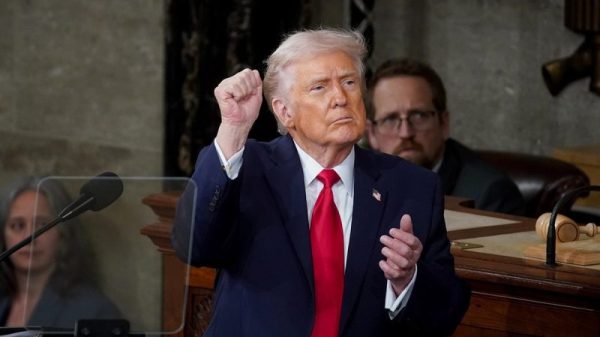We hear from readers a lot wanting to know how the Constitution’s 14th Amendment could affect former president Donald Trump’s eligibility to run in the 2024 presidential race. Here’s what we know: A provision of the 14th Amendment could prevent Trump from running for office again. It’s up to the Supreme Court to decide the issue.
In 1868, three years after the end of the Civil War, the United States ratified the 14th Amendment to guarantee equal rights to those who had been enslaved. Section 3 of the amendment barred from office those who engaged in insurrection after taking an oath to uphold the Constitution. The measure was used initially to keep former Confederates from returning to power but was written broadly to account for future insurrections.
2024 presidential election
1/5
End of carousel
Trump’s opponents have cited Section 3 in lawsuits filed around the country that argue Trump engaged in insurrection before and during the attack on the U.S. Capitol on Jan. 6, 2021, and therefore can’t run again. Colorado’s top court in December determined Trump was ineligible to appear on the primary ballot in that state but put its decision on hold as Trump appealed the case to the Supreme Court. (Maine’s secretary of state also found Trump was ineligible to run, but a state court blocked her determination for now. Courts in other states so far have allowed Trump to run.)
The Supreme Court will hear arguments on Feb. 8 and is expected to decide the issue for all states. Trump has argued the attack was not an insurrection and has said even if it was, he did not engage in it. He has also argued Section 3 does not apply to the presidency and has maintained Congress, not the judiciary, should be the one to handle questions related to candidates’ eligibility for office.
We hear from readers a lot wanting to know how the Constitution’s 14th Amendment could affect former president Donald Trump’s eligibility to run in the 2024 presidential race. Here’s what we know: A provision of the 14th Amendment could prevent Trump from running for office again. It’s up to the Supreme Court to decide the issue.
In 1868, three years after the end of the Civil War, the United States ratified the 14th Amendment to guarantee equal rights to those who had been enslaved. Section 3 of the amendment barred from office those who engaged in insurrection after taking an oath to uphold the Constitution. The measure was used initially to keep former Confederates from returning to power but was written broadly to account for future insurrections.
2024 presidential election
1/5
End of carousel
Trump’s opponents have cited Section 3 in lawsuits filed around the country that argue Trump engaged in insurrection before and during the attack on the U.S. Capitol on Jan. 6, 2021, and therefore can’t run again. Colorado’s top court in December determined Trump was ineligible to appear on the primary ballot in that state but put its decision on hold as Trump appealed the case to the Supreme Court. (Maine’s secretary of state also found Trump was ineligible to run, but a state court blocked her determination for now. Courts in other states so far have allowed Trump to run.)
The Supreme Court will hear arguments on Feb. 8 and is expected to decide the issue for all states. Trump has argued the attack was not an insurrection and has said even if it was, he did not engage in it. He has also argued Section 3 does not apply to the presidency and has maintained Congress, not the judiciary, should be the one to handle questions related to candidates’ eligibility for office.





















